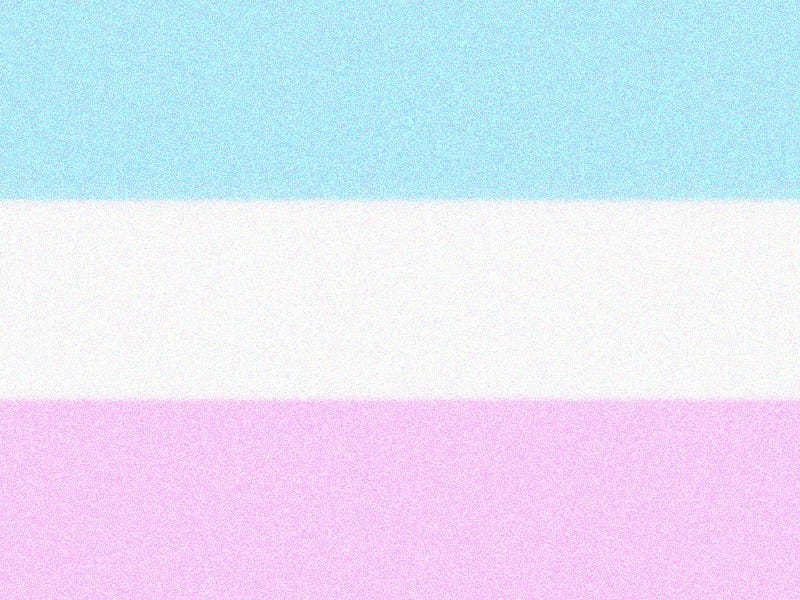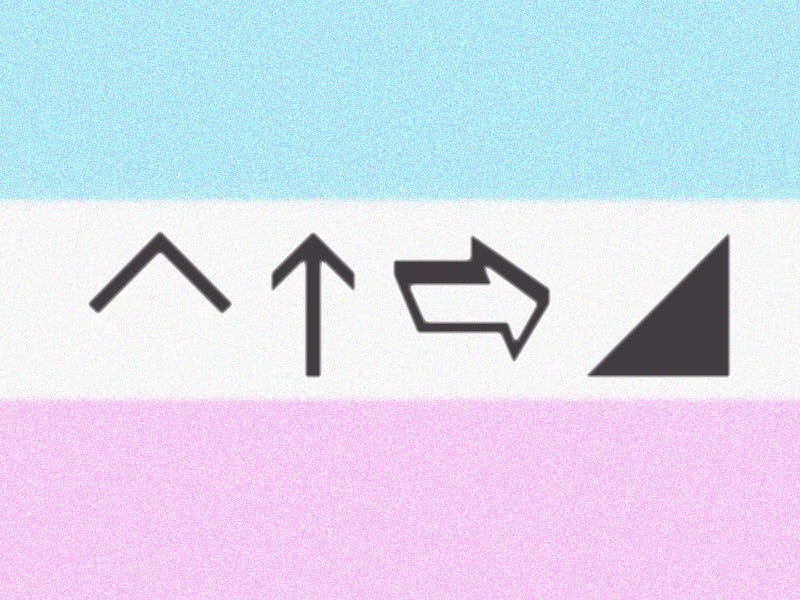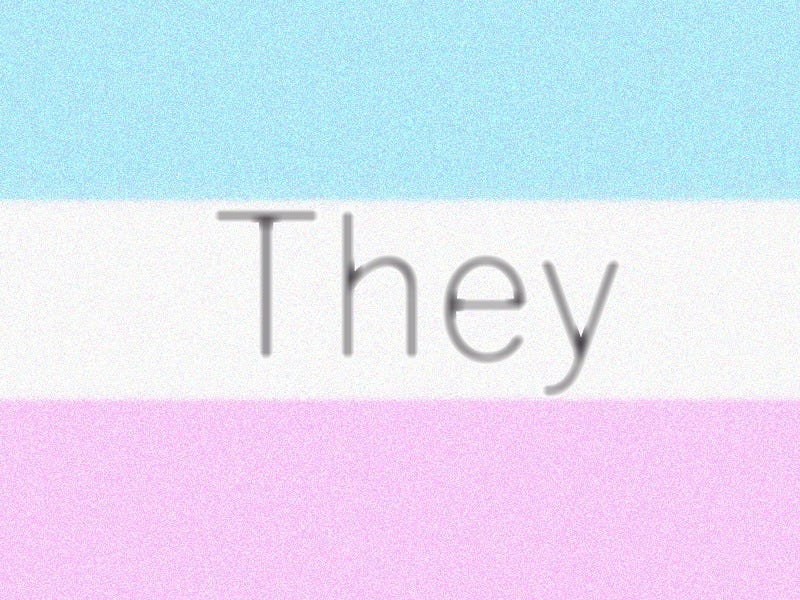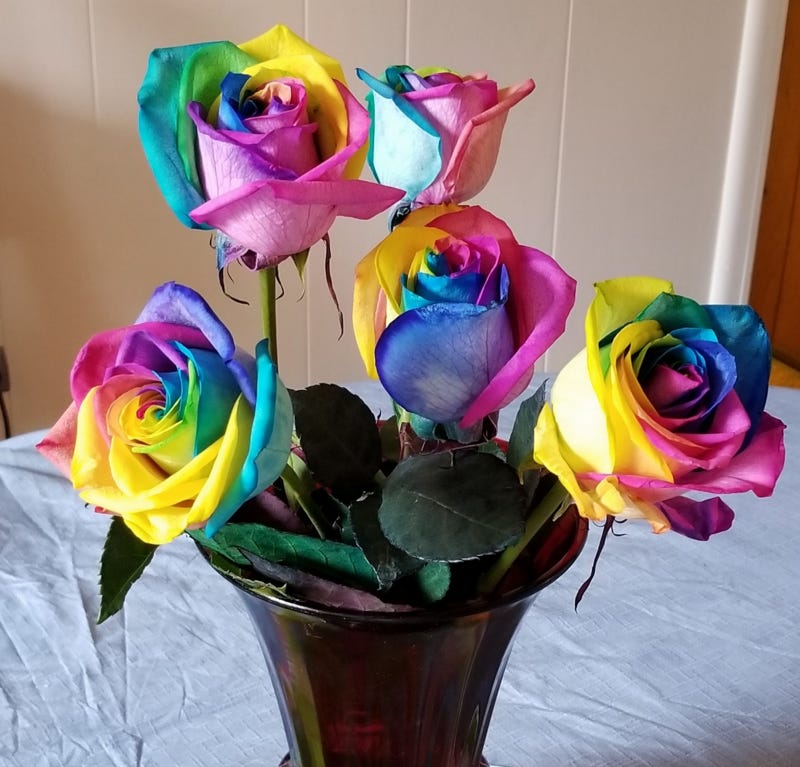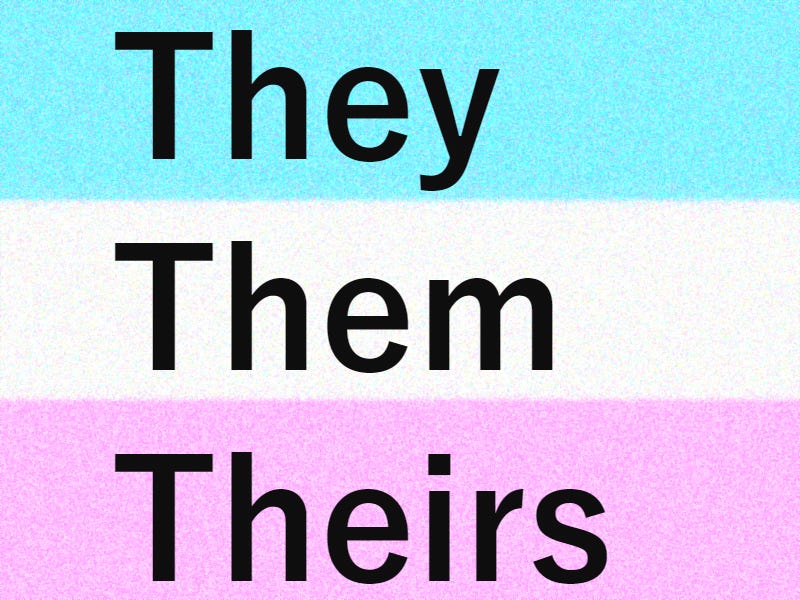Here’s to unexpected gender euphoria!
I write about happy things very rarely. My emotional landscape is a Juggalo-caliber Dark Carnival of simulated demises, nourished grudges, and silica packets that are imagined to be dead rats rotting in my couch. I circle my worst memories over and over, and write about them obsessively, until no facet has gone unexplored. I put off telling hard truths to people for years, because I’m terrified of receiving the worst possible response. When a happy moment does come my way, I find myself imagining its demise.
It’s no wonder my writing is populated with ableism, sexism, transphobia, rape culture, and smirking disdain for people whom I have decided to see as personal enemies even though we’ve never met and never will. My Club Nintendo handle is Dr. Grump for a reason. I don’t know how to tell a happy story.
Things can’t be simpler or easier than I anticipated they would be. It can’t be that I’m not the hero, and that the world is not malevolent, and that I don’t have to do any resisting or fighting of any kind in order to survive. How would I even structure a story like that?
I have no idea. But I’m gonna have to figure it out, because I do have a story like that to tell.
…
Before I came out to anyone in my life, I spent years peeking out of the closet through a hole I’d carved for myself on the internet. I used “they/them” pronouns in my author bios and on social media platforms that my real life friends didn’t regularly view; I came out to internet acquaintances and even wrote stories and essays about my identity, but never shared them with anybody else. I knew what I was, and I’d even begun to take some pride in it. But sharing it with anyone in the real world was a completely different matter.
Prior to coming out, I believed that I could hold my nonbinary identity inside of myself, and find comfort in it without ever having to risk telling anybody about it. Just knowing the truth could be enough. I imagined it as this little glowing ball in my chest, that warmed me from the inside, sight unseen.
In private, knowing what I was, I felt authenticity and joy. But I thought there was no use in trying to feel that way around anyone else. I’d always seen myself as kinda hemmed in and misunderstood by other people. Connecting in a meaningful, fully honest way seemed like too much to ask for.
I found freedom through solitude and withdrawal. When I was alone, I couldn’t be misunderstood. I could think, speak, carry myself as I liked. I didn’t have to monitor how I was coming across, or try to manage how other people saw me. It was a lonesome kind of freedom, but better than the self-conscious wrongness I felt around people.
…
One night, a few years ago, I laid in bed listening to my boyfriend tell me about a discussion at his work. Someone had suggested that meetings begin with “pronoun circles”. One teacher on the team, a cis woman, opposed the idea. She said that if there was an obviously transgender person on the team, she could just ask that person what their pronouns were. There was no need to make a group of obviously cis people engage in it.
My boyfriend was irritated by this. “You can’t just look at somebody and tell,” he said to me, staring up at the ceiling. “Anybody can be any gender. You can’t just look at them and know.”
I knew, then, that the years I’d spent concealing myself from him had been totally unnecessary. I came out to him the next evening.
…
With him, the switch to “they” was seamless. He essentially never called me “she” again. I became his partner, not his girlfriend. Once, when I offered to go on a late-night La Croix run, he put a hand on my leg and gratefully said “Girl…” and then immediately changed it to “Person…”, which we both found pretty laughable.
His ready, easy affirmation of my identity was emboldening. Being called “they” and his “partner” felt right. I craved more of that rightness. Over the next few months, I came out to real-life friends. I made a coming-out post on Facebook, I told people in the performance and writing circles I occupied about my identity, and I even corrected a few people who called me “she”. It felt good.
The more I was forthright I was about myself, the more confident and comfortable I became. I felt more active and outgoing. I made new friends. I started dressing the way I’d always longed to. Even my body image issues evaporated. A friend from high school told me I seemed more open and free. I was amazed to hear it from him. He’d known me for a long time, and seen me occupy many identities over the years, so I feared he’d see my nonbinary identity as fraudulent or an attention-seeking. But even he noticed my growing happiness and ease.
…
When it came to my family, though, I remained cautious and self-protective. My boyfriend and most of my social circle was well-versed in trans issues, after all. Each of them had known trans and nonbinary people prior to me. They lived in major cities where queer people were thick on the ground. And they were all somewhere on the political left.
My family, in contrast, lived in suburban Ohio. My mom, her parents, and all her siblings were lifelong Republicans. My mom wasn’t really a social conservative, and I’d never heard her say or do anything anti-gay or anti-trans, but people she’d voted for certainly had. My sister had some gay friends and a generally open-minded attitude, but she was petty apolitical, and I wasn’t sure if she’d ever known anybody trans before.
Even though my mom and her family had never espoused bigotry, I worried that their views had been influenced by conservative writers and commentators, who often see trans folks as demanding and out-of-touch with reality. Even some moderate liberals see nonbinary people like me as ridiculous and irrational, after all. So I defaulted to assuming the worst. And, assuming the worst, I decided not to share it with my family, or speak about it to them, for years.
…
Last summer, my sister came to visit me in Chicago. It was a week or two after Pride, and we found ourselves pouring over the discounted Pride stuff on sale at Target.
My sister caught me looking at a trans flag pin and asked me what the symbol meant.
I said, it’s for trans people.
“Are you a trans person?” she asked me.
“Some kind of one,” I said.
The next day, at breakfast, I decided to finally discuss it with her.
“Do you know what nonbinary is?”
“Someone who doesn’t identify as a man or a woman”, she said, or something similarly accurate. She’d been reading my social media posts for years. She’d seen me talk about being nonbinary, and I’m sure had been waiting a long time for me to broach the subject.
Telling her, I felt immensely nervous and self-conscious, but it went off without a hitch. I explained the pronoun thing to her, and she started practicing it that weekend.
…
A month later, my sister, my mom, and my boyfriend went to Las Vegas to celebrate my mom’s 60th birthday. After a day or two of stressing over the gender and pronoun conversation, I brought it up again with my mom present. I can’t remember what I said, only that it was brief, and anxious, and a bit indirect.
It was the first time I had ever said a thing about being trans to my mother’s face. She’d seen the social media posts, read the essays I’d posted, talked to my sister about it, I’m sure. She knew. But I’d never had the confidence, or the self-respect, frankly, to level with her about it. I wasn’t sure how to explain it. I was so scared she’d think I was being dumb.
She smiled and said she’d describe my sister and I as her “babies”, instead of her “girls” or her “daughters”. I was encouraged by that. But I was still too anxious and filled with doubt to ask for anything more. Throughout the rest of the trip, I found a few private moments to talk about pronouns with my sister, who was still working on getting the hang of it. I couldn’t bring myself to ask the same of my mom.
I didn’t want my mom to feel judged and corrected. And I still felt shame over asking to be recognized. I wasn’t ready. I couldn’t stop trapping myself under imagined worst-case scenarios.
…
I guess I have managed to craft this into a negative narrative. This has become a story about my own fear, and how I’ve allowed it to alienate me from other people.
I do wish I was more trusting and confident. I think I owed my family and my boyfriend the truth a lot sooner than they actually got it. If I’d been more assertive and self-assured, I could have spared all of us a lot of frustration.
But I’m not totally comfortable with this version of the story. It’s not wholly accurate. It’s not like my fears were irrational. I encounter dismissive essays and social media posts that portray trans people as fragile, loud-mouthed babies every single day of my life. Media outlets, especially conservative ones, are filled with content and comments that portray people like me as worthy of derision. It’s not hysterical of me to be discouraged by all that.
Still, this is a happy story. And a story with minimal conflict. In this story, I am not some triumphant hero who overcomes their own self-doubt, or fights and conquers the bigotry of other people. In this story, I am a gloomy, self-isolating pessimist who learns the world is not as bad as they thought and who, for the first time in their condescending life, is happy as fuck to be proved wrong. So let’s get to the climax already.
…
I went home for Mother’s Day this year. I spent the week before my visit hyping myself up for pronoun and gender conversations. . This time it’s gonna be different, I told myself. I will correct them, politely but assertively, if they call me she. I practiced what I was gonna say. I filled myself up with trepidation and determination. I told myself I deserved to stand firm.
And then when I arrived, and my mom called me “she”, my sister immediately corrected her.
“They,” she said.
And my mom said, “Oh, sorry, they.”
And my sister turned to me and said, “We’ve been practicing.”
And all the air flew out of my puffed-up, self-defensive little sails.
…
The two of them had been practicing. My sister called me “they” the whole time I was there. Whenever a “she” almost slipped her lips, she fixed it. She was breezy and easy-going about the whole thing. And she corrected our mom several times, too.
When my mom was corrected, she was apologetic. When I told her that I was impressed with the progress she had made, she said she felt like she still messed up a lot. She was not resistant to getting better. She didn’t think it was ridiculous for me to want to be addressed as “they”. She seemed to very much want to get it right.
I learned that my sister had told her new boyfriend about me, too. He called me “they” and referred to me as my sister’s “sibling” the entire time. My sister also introduced me to her tattoo artist as “they” as well, and even took the time to explain it to him. He didn’t quite understand it, but I was touched that she put in that much effort.
I spent the whole visit feeling comfortable and seen. I didn’t have to hide myself or hold my tongue. There was no negotiation between my truth and other people’s comfort. The two things simply co-existed. The little light was in my hands and glowing bright.
…
I can’t overstate how radically and quickly my family’s recognition has changed me. I’m full of peace. When I got back to Chicago, I found myself saying “Hello!” and “Good afternoon!” to strangers on the street. I started meeting people in the eye. I corrected people when they call me the wrong pronoun and didn’t feel guilty to for doing so. I stopped fearing a looming job interview. Every human interaction that I would have approached with dread was met with ease and lightness.
I have so much fucking hope now. My family, who knows hardly any trans people, can get my pronouns right. And they don’t think I’m being a pain for wanting them to. People can learn. People will learn. I’m aware, for perhaps the first time in my life, that most of humanity is trustworthy and deserves to be given a chance.
My family and I are in a place that I thought was gonna take years to reach. And if anything, I was the one who made that hard to do! I spent years eluding to who I was, but not saying it. I never communicated my needs to them. I wrote about my feelings in a sideways fashion but never explained things to them directly. And despite all that, they wanted to know me and do right by me. They put in the effort. They loved me when I didn’t feel safe asking them to.
…
I guess this story can still be construed as partly sad, because I can point to many instances where I got in the way of myself. I hid the truth from my boyfriend, family, and childhood friends. I came out in a slow, cowardly way, never trusting other people to love me. I was consumed with wrong-headed fears for years, and it took me a long time to realize it and get out of my own way.
But all I can feel is grateful. I don’t want to mourn the time I squandered being afraid. I don’t want to feel bad about myself or my ability to connect with people anymore. One of the primary lessons of this experience is that I am loved, and deserving of love.
…
After writing the first draft of piece, I called my mom. We talk every Sunday. Always have, ever since I left home for college twelve years ago.
We shot the shit for a bit, talked about what each of us had been up to this week. Then I thanked her for being so amazing about pronouns during my Mother’s Day visit. I told her I was grateful that she’s been trying so hard to get it right, and that I was thankful she didn’t think the whole nonbinary thing was stupid.
She replied, “Why would I think it’s stupid? You’ve never done anything that I thought was stupid.”
Then a highlights reel of my teen years flashed across both our minds.
“Well,” she said. “Maybe a couple things, a long time ago.”
I’ve never felt more accepted and accurately seen.





